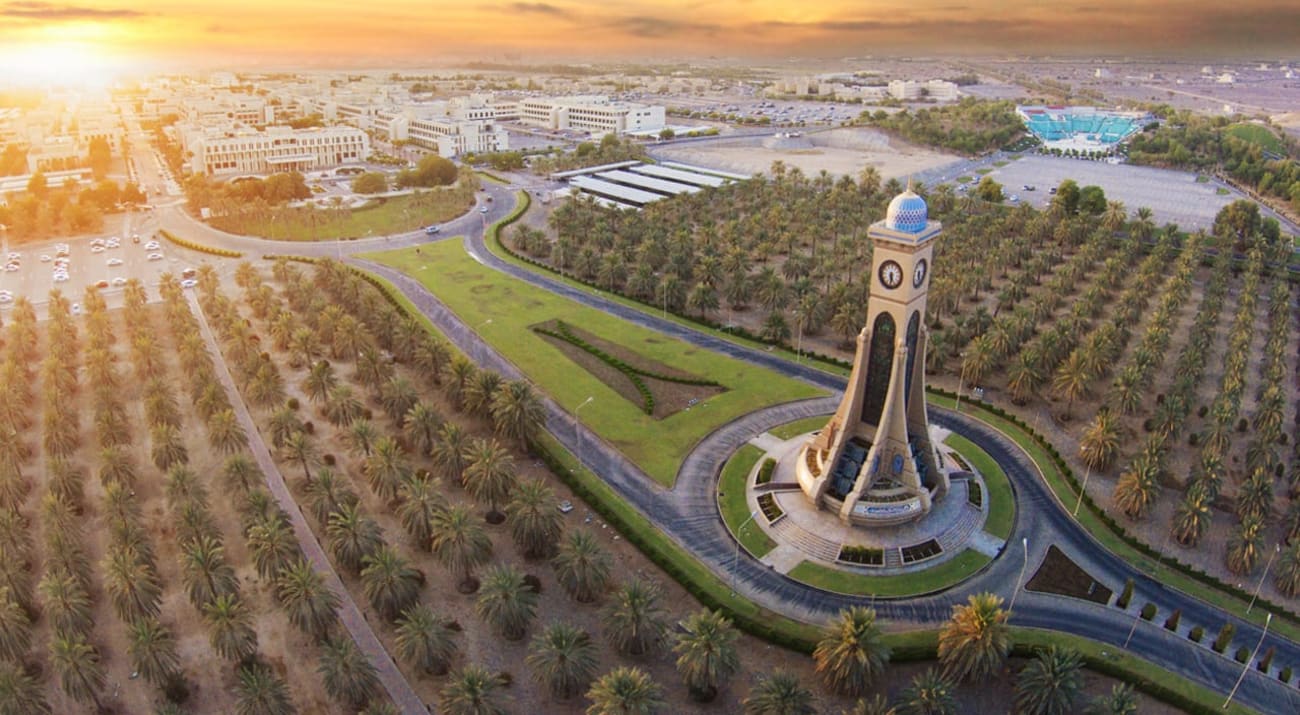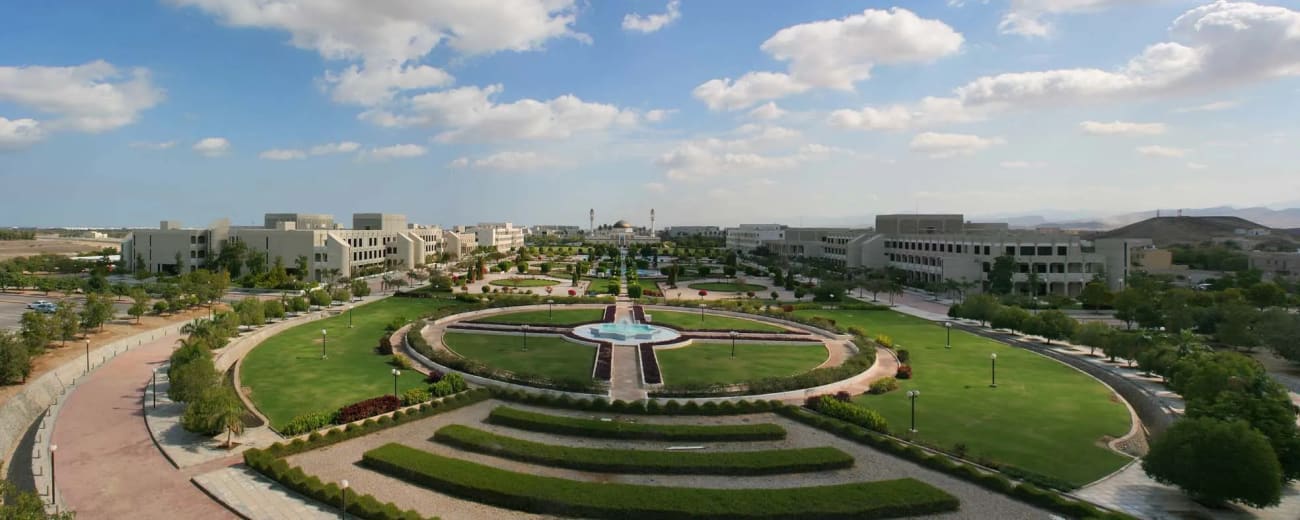
Sultan Qaboos University

Complimentary Lecture!!! Topic: "Nature and Opportunities of Postgraduate Studies in Natural Resource Economics at Sultan Qaboos University"
Presented By: Dr.Ibtisam Al Abri 3. Date : Thursday 29, December 2022 4. Time: 3:00 - 4:00 pm (MCT time) 5. click link read more Or dial: (US) +1 401-702-0709 PIN: 578 970 636#
Introduction
Join our complimentary Lecture!
- Topic: "The Changing Geopolitics of the Middle East"
- Presented By: Prof. Houchang Hassan-Yari
- Date : Monday 28 November 2022
- Time: 2:00 PM (MCT time)
- Link for Google MEET: https://meet.google.com/ijb-mfqw-mca
Sultan Qaboos University is the realization of the promise announced by His Majesty Sultan Qaboos Bin Said during the 10th anniversary of Oman’s National Day in 1980. Construction started in 1982 and the first Sultan Qaboos University students were enrolled in 1986. In accordance with the Royal Directives of His Majesty, The University commenced with five colleges; namely Medicine, Engineering, Agriculture, Education, and Science. Furthermore, the College of Arts was established in 1987, following the College of Commerce and Economics which was developed in 1993. The College of Law joined the University in 2006 and finally, the College of Nursing was established in 2008.
The design and construction of the campus were carried out with great attention to the fulfillment of these objectives, with the overall appearance of the buildings carefully planned to accommodate the physical, intellectual, and spiritual needs of students, faculty, and staff.
Set in a valley beneath the stark panorama of the nearby foothills of the Oman Mountains, the University is a tasteful array of buildings designed with arches and courtyards and constructed in white and pink sandstone in a manner that reflects traditional Omani and Islamic architecture. The University was constructed on an axis in the valley with one end aligned toward Mecca.
This axis line starts at the gates of entrance to the University, runs through the Administration Building with its massive Omani doors, and extends uninterrupted through the middle of the academic buildings to the University Mosque at the western end of the campus. The Mosque, with its large dome and minarets, is situated on the higher ground of the campus and is visible from many points within and around the University.
During the design period, the University landscaping was carefully considered and the original plantings have since become verdant gardens and flower beds. The plantings include species, native to Oman and other Gulf regions, that grow and flourish in an arid environment. The landscaping provides shade from the sun, shelter against the wind, and a splendid display of color from flowers and foliage throughout the year.
The traditional Islamic separation of the genders is maintained in the architecture of the University. There is separate access to buildings through lower and upper walkways for men and women and separate seating in the classrooms.
Altogether, the campus portrays the rich heritage of Oman and Islam while incorporating all the efficiencies of modern life. The result is an educational and living environment that is both functional and attractive.
Highlights from the Speech of His Majesty Sultan Qaboos Bin Said During His Visit to Sultan Qaboos University on May 2nd, 2000
- We are proud of this university; and more than that, we are proud of you in Oman and elsewhere.
- Knowledge is renewable, and we have to add something new to world knowledge.
- We want this to be a world-class university.
- The suppression of ideas and thought is a major sin, and we will never allow anyone to stifle freedom of thought.
- Our religion stands for knowledge and thought. It has never been, at any time, against inquiry or knowledge-seeking.
- There is no doubt that the economy is the basis of everything. The greater the national income of a country, the stronger its economy will be. That is why the national income is always more important than government revenues. The national income represents the country’s main source of income.
- One should start with the basics and then move on steadily from there. Then, as the wheel of development continues to turn, more progress will be achieved.
Vision
SQU’s vision is to continue its national leading role in higher education and community service and also to be internationally recognized for innovative research, quality of its graduates, and strategic partnerships.
Mission
To excel in teaching and learning, research and innovation, and community service by promoting the principles of scientific analysis and creative thinking in a collegial and stimulating environment and to participate in the production, development, and dissemination of knowledge and interact with national and international communities.
Values
Sultan Qaboos University is committed to preserving the following core values:
- Excellence
- Loyalty
- Integrity
- Credibility
- Equity
- Commitment
- Collegiality
Objectives
As stated in the University Law issued by Royal Decree No. 71/2006 dated 2nd July 2006, Sultan Qaboos University aims to achieve the following objectives in the areas mentioned:
Higher Education
- Graduation of alumni cohorts who value their cultural and Islamic heritage and are keen to strengthen their faith in God and their loyalty to the nation and the Sultan.
- Preparation of Omani youth who are strong in morals, committed to scientific inquiry, qualified academically and trained to be self-dependent and ready for continuous service to their country.
- Preparation of creative and innovative Omani youth who are lifelong self-learners.
- Provision of specialists and experts of Oman in diverse fields, taking into account the changing need of the marketplace and working within the framework of state policy on resource development.
- Constant modernization of the educational process at the undergraduate and postgraduate levels.
Research
- Conduct research and studies, both theoretical and applied, to serve the community and contribute to the generation of scientific solutions to social and economic problems.
- Research linked to the Sultanate's comprehensive development plans and social vision.
- Preparation of Omani scientists, researchers, and experts capable of undertaking organized, systematic and innovative work in diverse areas of science, arts, and technology.
Community Service
- Participation in community service and development through direct and continuous interaction with economic, social, and cultural institutions, and the provision of scientific and technical advice to enable these institutions to utilize the University's skills and expertise.
- Human resources development through continuous academic and training programs for social institutions and through the dissemination of scientific and human knowledge throughout the nation.
Cooperation with Other Academic Institutions
- International links and exchange with other academic institutions, particularly those in the Gulf Cooperation Council Countries.
- Interaction with international academic experience in all areas of thought, science, and culture.
Performance Evaluation
The use of evaluation studies conducted by consultation teams, particularly in the following areas:
- Organization of the relationship between the University Council and the University's institutions in both academic and administrative spheres in a way that facilitates smooth operation and functioning.
- Development of teaching programs and quality standards and the encouragement of student activities.
- Training that develops academic staff skills and enhances performance; also the creation of appropriate incentives.
- Development of academic research plans and programs and organization of research training.
- Cooperation with leading international universities and institutions.





